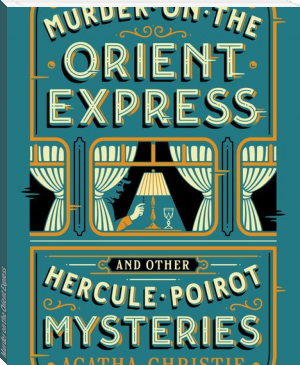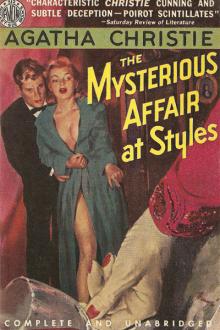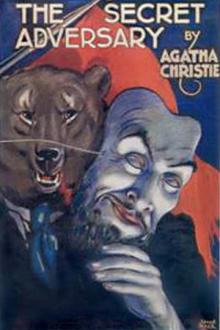Murder on the Orient Express - Agatha Christie (always you kirsty moseley .TXT) 📗

- Author: Agatha Christie
Book online «Murder on the Orient Express - Agatha Christie (always you kirsty moseley .TXT) 📗». Author Agatha Christie
Ratchett spoke to his companion, who got up and left the car. Then he rose himself, but instead of following MacQueen he dropped unexpectedly into the seat opposite Poirot.
"Can you oblige me with a light?" he said. His voice was soft - faintly nasal. "My name is Ratchett."
Poirot bowed slightly. He slipped his hand into his pocket and produced a matchbox which he handed to the other man, who took it but did not strike a light.
"I think," he went on, "that I have the pleasure of speaking to Mr Hercule Poirot. Is that so?"
Poirot bowed again. "You have been correctly informed, Monsieur."
The detective was conscious of those strange shrewd eyes summing him up before the other spoke again.
"In my country," he said, "we come to the point quickly. Mr Poirot, I want you to take on a job for me."
Hercule Poirot's eyebrows went up a trifle.
"My clientиle, Monsieur, is limited nowadays. I undertake very few cases."
"Why, naturally, I understand that. But this, Mr Poirot, means big money." He repeated again in his soft, persuasive voice, "Big money."
Hercule Poirot was silent a minute or two. Then he said: "What is it you wish me to do for you, Monsieur - er - Ratchett?"
"Mr Poirot, I am a rich man - a very rich man. Men in that position have enemies. I have an enemy."
"Only one enemy?"
"Just what do you mean by that question?" asked Ratchett sharply.
"Monsieur, in my experience when a man is in a position to have, as you say, enemies, then it does not usually resolve itself into one enemy only."
Ratchett seemed relieved by Poirot's answer. He said quickly:
"Why, yes, I appreciate that point. Enemy or enemies - it doesn't matter. What does matter is my safety."
"Safety?"
"My life has been threatened, Mr Poirot. Now I'm a man who can take pretty good care of himself." From the pocket of his coat his hand brought a small automatic into sight for a moment. He continued grimly. "I don't think I'm the kind of man to be caught napping. But, as I look at it, I might as well make assurance doubly sure. I fancy you're the man for my money, Mr Poirot. And remember - big money."
Poirot looked at him thoughtfully for some minutes. His face was completely expressionless. The other could have had no clue as to what thoughts were passing in that mind.
"I regret, Monsieur," he said at length, "that I cannot oblige you."
The other looked at him shrewdly. "Name your figure, then," he said.
Poirot shook his head.
"You do not understand, Monsieur. I have been very fortunate in my profession. I have made enough money to satisfy both my needs and my caprices. I take now only such cases as - interest me."
"You've got a pretty good nerve," said Ratchett. "Will twenty thousand dollars tempt you?"
"It will not."
"If you're holding out for more, you won't get it. I know what a thing's worth to me."
"I, also, M. Ratchett."
"What's wrong with my proposition?"
Poirot rose. "If you will forgive me for being personal - I do not like your face, M. Ratchett," he said.
And with that he left the restaurant car.
Chapter 4
A CRY IN THE NIGHT
The Simplon Orient Express arrived at Belgrade at a quarter to nine that evening. It was not due to depart again until 9.15, so Poirot descended to the platform. He did not, however, remain there long. The cold was bitter, and though the platform itself was protected, heavy snow was falling outside. He returned to his compartment. The conductor, who was on the platform stamping his feet and waving his arms to keep warm, spoke to him.
"Your valises have been moved, Monsieur. To the compartment No. 1, the compartment of M. Bouc."
"But where is Monsieur Bouc, then?"
"He has moved into the coach from Athens which has just been put on."
Poirot went in search of his friend. M. Bouc waved his protestations aside.
"It is nothing. It is nothing. It is more convenient like this. You are going through to England, so it is better that you should stay in the through coach to Calais. Me, I am very well here. It is most peaceful. This coach is empty save for myself and one little Greek doctor. Ah! my friend, what a night! They say there has not been so much snow for years. Let us hope we shall not be held up. I am not too happy about it, I can tell you."
At 9.15 punctually the train pulled out of the station, and shortly afterwards Poirot got up, said good night to his friend, and made his way along the corridor back into his own coach which was in front next to the dining-car.
On this, the second day of the journey, barriers were breaking down. Colonel Arbuthnot was standing at the door of his compartment talking to MacQueen. When MacQueen saw Poirot he broke off something he was saying. He looked very much surprised.
"Why," he cried, "I thought you'd left us. You said you were getting off at Belgrade."
"You misunderstood me," said Poirot, smiling. "I remember now, the train started from Stamboul just as we were talking about it."
"But, man, your baggage. It's gone."
"It has been moved into another compartment, that is all."
"Oh! I see."
He resumed his conversation with Arbuthnot, and Poirot passed on down the corridor.
Two doors from his own compartment, the elderly American, Mrs Hubbard, was standing talking to the sheep-like lady, who was a Swede. Mrs Hubbard was pressing a magazine on the other.
"No, do take it, my dear," she said. "I've got plenty of other things to read. My, isn't the cold something frightful?" She nodded amicably to Poirot.
"You are most kind," said the Swedish lady.
"Not at all. I hope you'll sleep well and that your head will be better in the morning."
"It is the cold only. I make now myself a cup of tea."
"Have you got some aspirin? Are you sure now? I've got plenty. Well, good night, my dear."
She turned to Poirot conversationally as the other woman departed.
"Poor creature, she's a Swede. As far as I can make out she's a kind of missionary. A teaching one. A nice creature, but doesn't talk much English. She was most interested in what I told her about my daughter."
Poirot, by now, knew all about Mrs Hubbard's daughter. Everyone on the train who could understand English did! How she and her husband were on the staff of a big American college in Smyrna, and how this was Mrs Hubbard's first journey to the East, and what she thought of the Turks and their slipshod ways and the condition of their roads.
The door next to them opened and the thin pale manservant stepped out. Inside, Poirot caught a glimpse of Mr Ratchett sitting up in bed. He saw Poirot and his face changed, darkening with anger. Then the door was shut.
Mrs Hubbard drew Poirot a little wide.
"You know, I'm dead scared of that man. Oh! not the valet - the other. His master. Master, indeed! There's something wrong about that man. My daughter always says I'm very intuitive. 'When Mamma gets a hunch, she's dead right,' that's what my daughter says. And I've got a hunch about that man. He's next door to me and I don't like it. I put my grips against the communicating door last night. I thought I heard him trying the handle. Do you know, I shouldn't be a bit surprised if that man turned out to be a murderer - one of these train robbers you read about. I daresay I'm foolish, but there it is. I'm absolutely scared to death of the man! My daughter said I'd have an easy journey, but somehow I don't feel happy about it. It may be foolish, but I feel as if anything might happen - anything at all. And how that nice young fellow can bear to be his secretary, I can't think."
Colonel Arbuthnot and MacQueen were coming towards them down the corridor.
"Come into my carriage," MacQueen was saying. "It isn't made up for the night yet. Now what I want to get right about your policy in India is this -"
The two men passed and went on down the corridor to MacQueen's carriage.
Mrs Hubbard said good night to Poirot. "I guess I'll go right to bed and read," she said. "Good night."
"Good night, Madame."
Poirot passed into his own compartment, which was the next one beyond Ratchett's. He undressed and got into bed, read for about half an hour and then turned out the light.
He awoke some hours later, awoke with a start. He knew what it was that had wakened him - a loud groan, almost a cry, somewhere close at hand. At the same moment the ting of a bell sounded sharply.
Poirot sat up and switched on the light. He noticed that the train was at a standstill - presumably at a station.
That cry had startled him. He remembered that it was Ratchett who had the next compartment. He got out of bed and opened the door just as the Wagon Lit conductor came hurrying along the corridor and knocked on Ratchett's door. Poirot kept his door open a crack and watched. The conductor tapped a second time. A bell rang and a light showed over another door farther down. The conductor glanced over his shoulder. At the same moment a voice from within the next compartment called out: "Ce n'est rien. Je me suis trompй."
"Bien, Monsieur." The conductor scurried off again, to knock at the door where the light was showing.
Poirot returned to bed, his mind relieved, and switched off the light.
He glanced at his watch. It was just twenty-three minutes to one.
Chapter 5
THE CRIME
He found it difficult to go to sleep again at once. For one thing he missed the motion of the train. If it was a station outside, it was curiously quiet. By contrast the noises on the train seemed unusually loud. He could hear Ratchett moving about next door - a click as he pulled down the washbasin, the sound of the tap running, a splashing noise, then another click as the basin shut to again. Footsteps passed up the corridor outside, the shuffling footsteps of someone in bedroom slippers.
Hercule Poirot lay awake staring at the ceiling. Why was the station outside so silent? His throat felt dry. He had forgotten to ask for his usual bottle of mineral water. He looked at his watch again. Just after a quarter past one. He would ring for the conductor and ask for some mineral water. His finger went out to the bell, but he paused as in the stillness he heard a ting. The man couldn't answer every bell at once.
Ting... Ting... Ting...
It sounded again and again. Where was the man? Somebody was getting impatient.
Ti-i-i-ing!
Whoever it was, was keeping a finger solidly on the push-button.
Suddenly with a rush, his footsteps echoing up the aisle, the man came. He knocked at a door not far from





Comments (0)